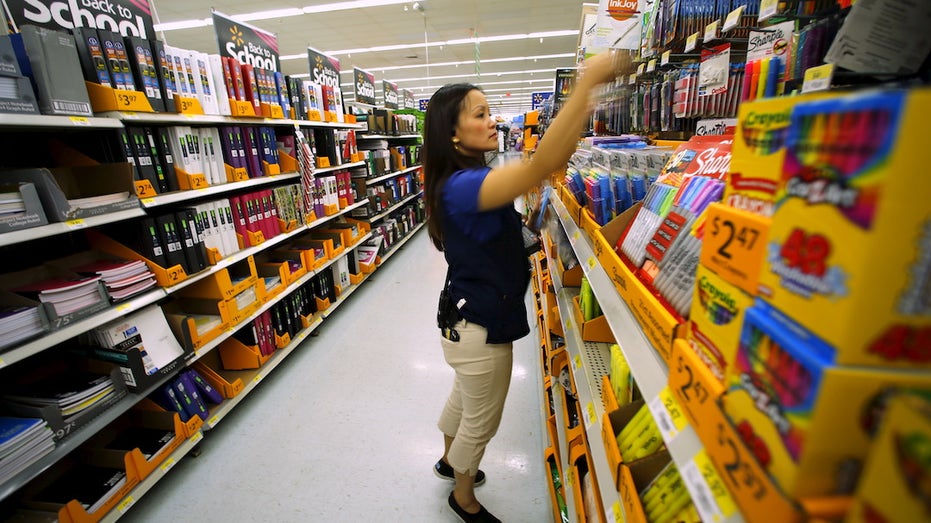FOX Business Flash top headlines for July 14
Check out what’s clicking on FoxBusiness.com.
Consumers are prioritizing back-to-school shopping even as inflation continues to surge, hitting a new four-decade high in June.
According to the National Retail Federation (NRF) and Prosper Insights & Analytics' annual survey, total back-to-school spending is projected to reach $37 billion, matching 2021's record high.
To cover the cost of school supplies for the upcoming year, though, 38% of consumers say they have to cut back in other areas, according to the nation's largest retail trade group.
JUNE INFLATION BREAKDOWN: WHERE ARE CONSUMER PRICES RISING THE FASTEST?
Walmart department manager Karren Gomes helps stock shelves with school supplies as the retail store prepares for back-to-school shoppers in San Diego Aug. 6, 2015. (REUTERS/Mike Blake / Reuters Photos) "Families consider back-to-school and college items as an essential category, and they are taking whatever steps they can, including cutting back on discretionary spending, shopping sales and buying store- or off-brand items in order to purchase what they need for the upcoming school year," NRF CEO Matthew Shay said in a statement. Families with children in elementary school through high school are projected to spend an average of $864 during what's seen as one of the "most significant shopping events for consumers and retailers alike, second only to the winter holiday season," according to Shay. That projection is an increase of $15 from 2021, and up $168 from 2019, according to the data. INFLATION TIMELINE: MAPPING THE BIDEN ADMIN'S RESPONSE TO RAPID PRICE GROWTH Back-to-school supplies at a store in July in Marlborough, Mass. (AP / AP Newsroom) Meanwhile, back-to-college spending is expected to reach nearly $74 billion, surpassing last year's record of $71 billion and marking "the highest in the survey’s history," according to the NRF. Each family is projected to spend an average of $1,199 on items for college, which is "consistent with last year’s record of $1,200," according to the NRF. However, it's $223 more on average compared with 2019. More than half of consumers, 56%, have already started their shopping as of early July, according to the data. However, "given this year’s inflationary pressure, traditional sales events may play an even larger role for back-to-school and college shoppers," according to the retail trade group. Back-to-school shopping. (iStock / iStock) Over 80% of shoppers plan to capitalize on retailer deals throughout the week of July 11. About three out of five shoppers were projected to shop specifically during Prime Day. CLICK HERE TO READ MORE ON FOX BUSINESS People are also consolidating their shopping trips rather than spreading them out across multiple destinations. So far this year, most shoppers have been heading online for their desired educational items. Department stores and discount retailers have also been top destinations, according to the retail trade group. Due to the shift in spending habits, retailers are also shifting by bringing in inventory earlier and extending back-to-class offerings," said Phil Rist, Prosper Insights executive vice president of strategy. Source: Read Full Article





